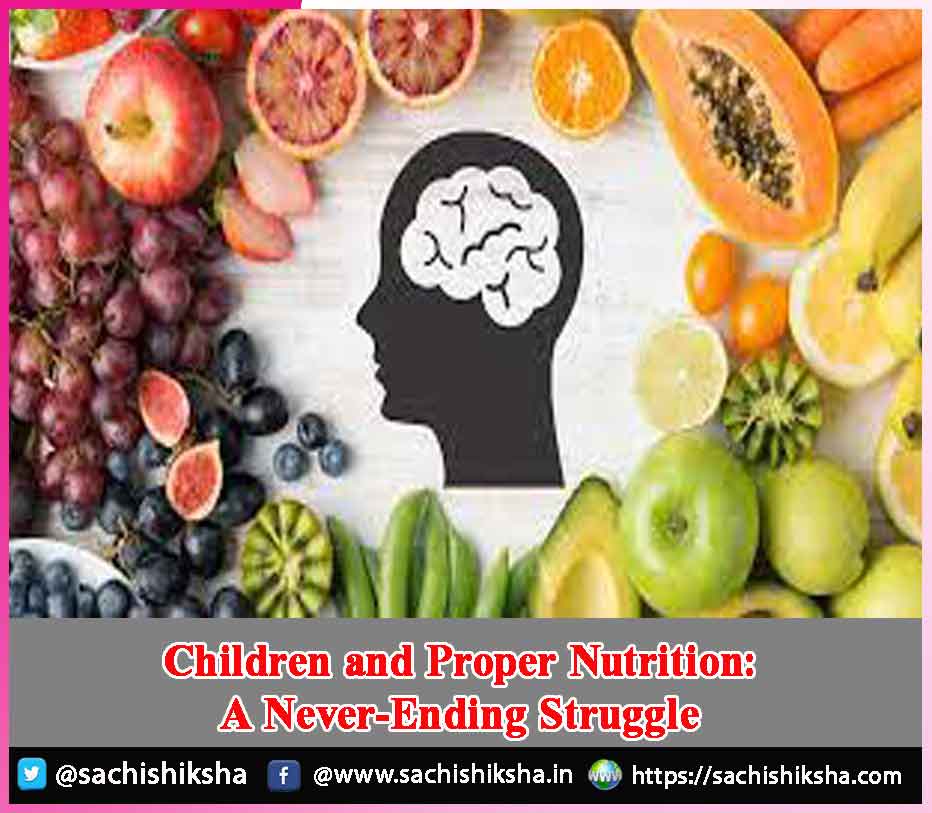Children and Proper Nutrition: A Never-Ending Struggle
Introduction: Proper nutrition is essential for children’s growth and development, but it can often feel like a never-ending struggle for parents and caregivers. In today’s fast-paced world, where processed and convenient foods are readily available, ensuring that children receive the necessary nutrients can be a challenge.
However, the effort to provide children with a balanced diet is a vital one, as it impacts their overall health, cognitive development, and well-being. In this article, we will explore the importance of proper nutrition for children, common challenges parents face, and practical tips for promoting healthy eating habits
Table of Contents
Why Proper Nutrition Matters:

- Growth and Development: During childhood, children experience rapid growth and development. Adequate nutrition supplies the necessary nutrients, such as vitamins, minerals, and proteins that help them reach their full potential in terms of height and weight.
- Brain Development: Proper nutrition is essential for cognitive development. Nutrients like omega-3 fatty acids, iron, and vitamins play a crucial role in building healthy brain tissue and supporting cognitive functions like memory, attention, and problem-solving.
- Immune System Support: A well-balanced diet helps strengthen a child’s immune system, making them more resilient to illnesses and infections. Nutrients like vitamin C, vitamin D, and zinc are vital for immune health.
- Energy and Physical Activity: Nutrition provides the energy children need for physical activities and play. A diet rich in carbohydrates, protein, and healthy fats ensures they have the stamina to be active and participate in sports and other activities.
- Overall Health: Good nutrition reduces the risk of chronic diseases later in life. A diet high in fruits, vegetables, and whole grains, and low in sugar and processed foods, can help prevent conditions like obesity, diabetes, and heart disease.
Common Challenges in Ensuring Proper Nutrition:
The task of ensuring that children receive proper nutrition can be challenging for parents and caregivers. Here are some common obstacles they face:
- Picky Eating: Many children can be very selective about the foods they eat, which can make it difficult to provide a variety of nutrients. Picky eating is a normal phase, but it can be frustrating for parents.
- Busy Schedules: Parents often have busy schedules, making it challenging to prepare nutritious meals. Fast-food and convenient options can seem like the only feasible choice on hectic days.
- Marketing and Peer Pressure: Children are exposed to advertisements for unhealthy foods and can face peer pressure to eat certain items, even if they are not nutritious.
- Limited Food Access: In some areas, access to fresh, healthy foods can be limited, making it harder for parents to provide nutritious options.
- Food Allergies and Restrictions: Some children have food allergies or dietary restrictions that complicate meal planning and can lead to nutritional gaps.
- Lack of Nutrition Knowledge: Not all parents have access to accurate nutritional information, which can lead to poor food choices.
Practical Tips for Promoting Proper Nutrition:
Despite the challenges, parents and caregivers can take steps to ensure that children receive proper nutrition. Here are some practical tips to help make the process more manageable:
- Lead by Example: Children are more likely to eat a balanced diet if they see their parents and caregivers doing the same. Be a positive role model by consuming nutritious foods and demonstrating healthy eating habits.
- Involve Children in Meal Planning: Let children participate in meal planning and preparation. This can make them feel more connected to their food choices and increase their willingness to try new foods.
- Offer a Variety of Foods: Provide a wide range of foods from all food groups, including fruits, vegetables, whole grains, lean proteins, and dairy products. This ensures that children receive a broad spectrum of nutrients.
- Encourage Regular Meals and Snacks: Maintain a consistent meal schedule with regular mealtimes and snacks to prevent excessive hunger, which can lead to overeating or poor food choices.
- Make Healthy Food Fun: Get creative with food presentation to make healthy options more appealing. Cut fruits and vegetables into fun shapes or make a colorful salad to entice children’s interest.
- Limit Sugary Drinks: Avoid sugary drinks like soda and excessive fruit juices, as they can contribute to weight gain and tooth decay. Encourage children to drink water, milk, or diluted fruit juices instead.
- Monitor Portion Sizes: Pay attention to portion sizes to prevent overeating. Use child-sized plates and bowls to help with portion control.
- Reduce Processed Foods: Minimize the consumption of highly processed and sugary foods. These items are often low in nutrients and high in empty calories.
- Read Food Labels: Familiarize yourself with food labels to make informed choices when shopping for groceries. Look for products with lower sugar, salt, and unhealthy fats.
- Involve Children in Grocery Shopping: Take children with you when grocery shopping and involve them in selecting healthy options. Teach them to read food labels and make nutritious choices.
- Be Patient with Picky Eaters: It’s common for children to be picky eaters, but it’s important not to give in to their demands for unhealthy foods. Offer a variety of nutritious options and be patient as their tastes develop.
- Seek Professional Guidance: If you have concerns about your child’s nutrition, consult a pediatrician or a registered dietitian. They can provide personalized guidance and address specific dietary needs or restrictions.
Conclusion:
Proper nutrition for children is a never-ending struggle that requires effort and commitment from parents and caregivers. It is, however, a crucial investment in a child’s health and well-being.
By understanding the importance of nutrition, overcoming common challenges, and implementing practical tips, parents can provide their children with the foundation they need for their good health and development. Remember that it’s a journey, and small steps toward healthier eating habits can make a significant difference in the long run.













































